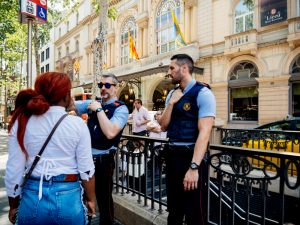
There are situations in which you make ask, can a cop tell you to leave public property. Knowing your rights is the first step to a successful encounter with the police. Whether you are protesting, or just standing on a street corner, you have certain rights. Keep reading to find out what those rights are.
The answer to this question depends on the legality of the officer’s order. If the officer tells you to leave because you’re disrupting traffic, the order is valid. If you are breaking the law in some other way, the order is legal. And if the officer tells you to leave because they disagree with your message, it’s void.

If you break any laws regulating the free flow of traffic or pedestrian safety, that’s illegal. If you are merely congregating on the sidewalk, you have every right to be there. Without giving a logical reason, a police officer cannot tell you to leave.
Your rights are the strongest when you are on streets, parks, or sidewalks. Other public properties include plazas in front of government buildings. As long as you don’t interfere with the purpose of the building, you’re fine.
You don’t need a permit if you’re walking on the sidewalks or in the street. If you obstruct car or pedestrian traffic, the police can ask you to move. Without a permit, you’ll need to allow others to pass safely.
You are free to enter and gather information in public places. You have to make sure, however, that you are not disturbing those around you. Occupying a public place does not make you immune from liability if you’re harassing others.
If a government-owned property has limitations to its access, you don’t get free reign. If you’re in a restricted area of a public building, you will need to leave. In addition, schools have public areas on campus, but the school might have limited access. If those areas connect to open public forums like the sidewalk, they might be accessible.
You have rights in this situation and they can apply to many different scenarios. There are also certain actions you should take when dealing with a tense situation. Some of these are:
Keep your hands visible and point out that you are not disrupting anyone’s activities. Also, your First Amendment right protects your right to assemble.
Even if you believe your rights are being violated, it’s best not to argue. Doing so could escalate the situation.
You do not have to consent to a search of yourself or of your belongings. If a police officer believes there is probable cause, they can perform a pat-down.
Ask the officer if you are free to go. If they say yes, do so calmly. Don’t talk back, this gives the officer a reason to react negatively towards you. Your job is not to de-escalate the situation, that ability remains on them. If you can stay calm, however, that should help the situation.
You do not have to answer any questions about yourself. If they ask you where you’re going or where you live, you can remain silent.
If you or a loved one has been arrested, please contact Blackman Bail Bonds. We collect all of the documents you need and are available 24 hours a day. We’ll walk you through the bail bonds process. Once we post your bail, you can wait for your trial in the comfort of your home.